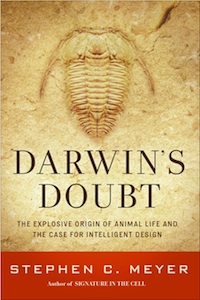 Evolution
Evolution
A Countercultural Appetite for Darwin’s Doubt
 As David Klinghoffer notes, over the weekend we learned that both the New York Times and Publishers Weekly will have Stephen Meyer’s Darwin’s Doubt on their respective bestsellers lists for the coming week. The book is #7 on the NYT and #10 on Publishers Weekly.
As David Klinghoffer notes, over the weekend we learned that both the New York Times and Publishers Weekly will have Stephen Meyer’s Darwin’s Doubt on their respective bestsellers lists for the coming week. The book is #7 on the NYT and #10 on Publishers Weekly.
This success testifies to the growing audience for intelligent design and scientific criticism of Darwinian theory. All our previous books and films, especially Dr. Meyer’s Signature in the Cell, have helped us to circumvent the mainstream media and develop what might be considered a countercultural appetite. We have always known that there is a public sympathy for our position, but now we see developing a really sizable population of readers who not only identify with ID, but also understand and support it. That audience follows the topic now and, obviously, has welcomed the new book.
Of course, the quality of Meyer’s work itself helps. When we get people to read it, they tell friends. Here, in one place, the scientific case for intelligent design is put forward in a way that scientists can appreciate and the ordinary informed reader can comprehend.
As you know, the standard Darwinian tactic is to ignore plausible counterarguments, and when that no longer suffices, to smear authors as creationists who don’t understand science. Those tactics are getting stale, however, and people are recognizing how they fit with similar authoritarian impulses in certain other areas of academia and media.
